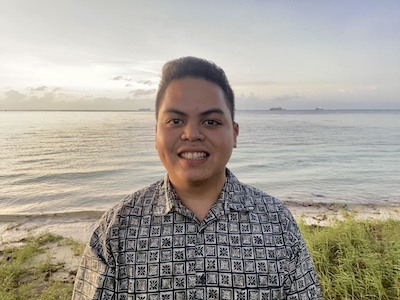By Cassidy Pekarek
Growing up on Rota in the Northern Mariana Islands, Thomas Mangloña II became aware of the necessity of journalism at a young age. “As a kid, there was no newspaper or reporter [on Rota], and that remains true to this day,” Mangloña said. “I entered the field of journalism because I saw what it was like to not have information, and I didn’t want my community to be left in the dark.”
Noticing this absence inspired Mangloña to take action. In middle school, he created a blog and started publishing stories, reporting on both local successes and on the issues that his community faced. Moving to Saipan to attend high school allowed him the opportunity to work with a local TV station to cover the aftermath of a recent typhoon, as well as join the school paper and work his way up to becoming an editor.
Mangloña left his home in the North Marianas to receive his B.A. in mass communication and media studies with high distinction from the University of California at Berkeley, where he was inducted into Phi Beta Kappa. He then received his M.A. in journalism at Stanford University, which allowed him the opportunity to take his work from theory to practice. When Mangloña returned home to work in the Northern Mariana Islands, he brought this experience and education back with him.
“I was often—and I continue to be—frustrated by what people in the industry call parachute journalism,” Mangloña said. Parachute journalism refers to the practice of sending people to report on areas in which they have little prior experience or understanding. Relying on parachute journalism ultimately risks reinforcing stereotypes within the media, distorting stories, and distracting from the big picture of the community they cover. “When you hear about the Pacific, a lot of times you get the paradise stereotypes, you get the remoteness stereotypes; it’s because people just don’t spend the time getting to know the community [they’re reporting on], so they rely on incorrect mainstream narratives.”
Working so close to home, with many of the same people he has been interviewing and working closely with since his first middle school blog, allows Mangloña to challenge stereotypes and misconceptions popularized by parachute journalism. For him, journalism is not a transactional exchange of information—it’s about building relationships.
“I look at conducting interviews and developing stories and sources as a long-term, authentic relationship; a lot of the process is relationship building,” Mangloña said. “That’s part of why I came home: I didn’t want to have a transactional relationship with the community that I cover.”
Mangloña currently works as a Regional Correspondent for KUAM News, a program stationed in Guam and affiliated with NBC and CBS. Recently, KUAM has worked to further expand their programming and coverage to the Northern Marianas. This undertaking is part of a major project funded by the Google News Initiative, which cultivates the global news industry by providing innovative tools to newsrooms.
“I’m grateful to KUAM for making this investment to cover the region,” Mangloña said. “Not many local stations in the Marianas have a regional correspondent, or someone who looks at what happens on the next island over as part of their job.”
Outside of KUAM, Mangloña is also preparing to start his fellowship under the Rosalynn Carter Center for Mental Health Journalism. He has decided to focus his attention on the mental health of students and families within the Northern Marianas over the next year, covering their experiences in the aftermath of recent typhoons and the Covid-19 pandemic.
Mangloña’s dedication to telling stories relevant to his community does not end there, however. He also hopes to further empower others within his community to pursue journalism: “It’s always been a goal of mine to teach journalism in the islands. I’m currently working to make that possible, whether through workshops, or with local schools, or even the community college.”
“Lots of folks here like to say that the ocean connects us, it doesn’t separate us,” Mangloña said. “Thinking about how my writing can serve as that connection too, has been a real motivator for me.”
For Mangloña, being a part of Phi Beta Kappa brings a sense of community—one that is both apparent within the immediate college community, and abroad. For him, “Staying up to date with what other members are doing across the nation and hearing each other’s stories builds a sense of identity and personal motivation.”
Cassidy Pekarek is a recent graduate of the University of Iowa, where she received her Bachelor of Arts Degree with honors and highest distinction in English and creative writing and art history. She was inducted into Phi Beta Kappa in 2022. The University of Iowa is home to the Alpha of Iowa chapter of Phi Beta Kappa.




